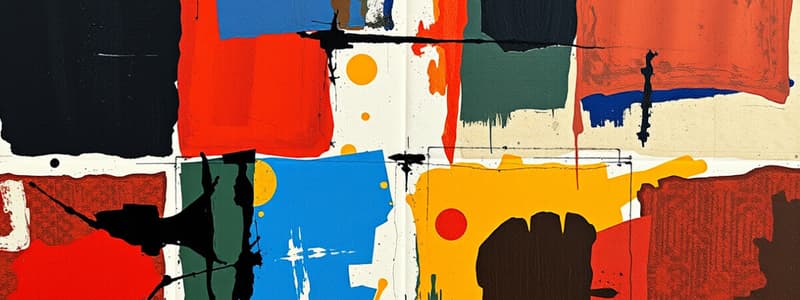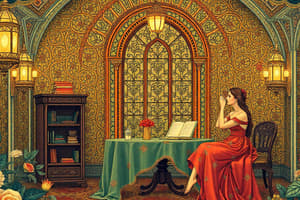Podcast
Questions and Answers
What is a core focus of Marxism in analyzing socio-economic systems?
What is a core focus of Marxism in analyzing socio-economic systems?
- The role of cultural institutions in shaping societal values
- The historical evolution of political ideologies
- The conflicts between different socio-economic classes (correct)
- The psychological motivations behind economic behavior
Which statement best characterizes structuralism in literary analysis?
Which statement best characterizes structuralism in literary analysis?
- It examines common underlying structures across literary works (correct)
- It interprets a text solely based on reader responses
- It focuses on the author's intentions and background
- It highlights the chronological order of narrative events
In the context of horror stories, which pattern is commonly observed?
In the context of horror stories, which pattern is commonly observed?
- Protagonists often achieve their goals despite obstacles
- Characters typically resolve conflicts through dialogue
- An innocent person encounters a strange noise and faces danger (correct)
- The setting is always a futuristic landscape
Which literary genre is likely to follow the 'whirlwind relationship' pattern described in the content?
Which literary genre is likely to follow the 'whirlwind relationship' pattern described in the content?
What is one of the primary goals of Marxism regarding people's experiences?
What is one of the primary goals of Marxism regarding people's experiences?
What does formalist criticism primarily focus on?
What does formalist criticism primarily focus on?
Which of the following best describes gender criticism?
Which of the following best describes gender criticism?
Historical criticism provides insight primarily into what aspect of a text?
Historical criticism provides insight primarily into what aspect of a text?
What aspect does reader-response criticism emphasize?
What aspect does reader-response criticism emphasize?
Which of the following is NOT a focus of formalist criticism?
Which of the following is NOT a focus of formalist criticism?
In the context of gender criticism, how is a typical princess often portrayed in Disney movies?
In the context of gender criticism, how is a typical princess often portrayed in Disney movies?
What does media criticism focus on?
What does media criticism focus on?
What is a significant claim of formalist criticism regarding literary texts?
What is a significant claim of formalist criticism regarding literary texts?
Flashcards are hidden until you start studying
Study Notes
Critical Approaches in Literary Criticism
- Critical approaches are perspectives used for analyzing literature, answering key questions regarding comprehension, intent, and interpretation of texts.
Formalist Criticism
- Concentrates solely on the literary text's intrinsic components, disregarding author background and audience interpretation.
- Asserts that a literary work possesses a fixed meaning and exists independently.
- Analyzes literary elements such as:
- Fiction: characters, point of view, setting, tone, symbols.
- Poetry: figures of speech, rhythm, form.
Gender Criticism
- Investigates the impact of gender on literature, particularly in character portrayal and thematic elements.
- Explores representations of masculinity and femininity in narratives.
- Example seen in Disney films where princesses typically represent vulnerability while male characters are depicted as brave heroes.
Historical Criticism
- Contextualizes a work within the historical events surrounding its creation, including the author's experiences.
- Aids in interpreting literature through the lens of social and political realities of the time.
- Example: Jose Rizal’s "Noli Me Tangere" as a reflection of Filipino oppression under Spanish colonial rule.
Reader-Response Criticism
- Focuses on the reader's emotional and cognitive engagement with a text.
- Argues that a work's meaning is shaped by the reader’s interpretation, experience, and reactions.
- Encourages personal reflection on feelings, lessons, and individual understanding derived from reading.
Media Criticism
- Examines how various media formats impact society, perception, and culture.
- Encompasses analysis of diverse media, including:
- Print: books, newspapers, magazines.
- Visual: television, movies.
- Digital: video games, music, internet platforms.
Marxism
- Addresses literature through the lens of socioeconomic class struggles and issues.
- Seeks to expose how class differences shape experiences and societal dynamics.
- Examples include Shirley Jackson's "The Lottery" and cultural phenomena like popular teleseryes.
Structuralism
- Explores underlying structures present within literature, identifying common patterns across genres.
- Asserts that all literary works share fundamental structural elements.
- Examples highlight common tropes in genre storytelling, such as:
- Horror narratives where an innocent character encounters danger leading to demise.
- Love stories characterized by a couple’s separation and eventual reunion for a positive resolution.
Studying That Suits You
Use AI to generate personalized quizzes and flashcards to suit your learning preferences.




